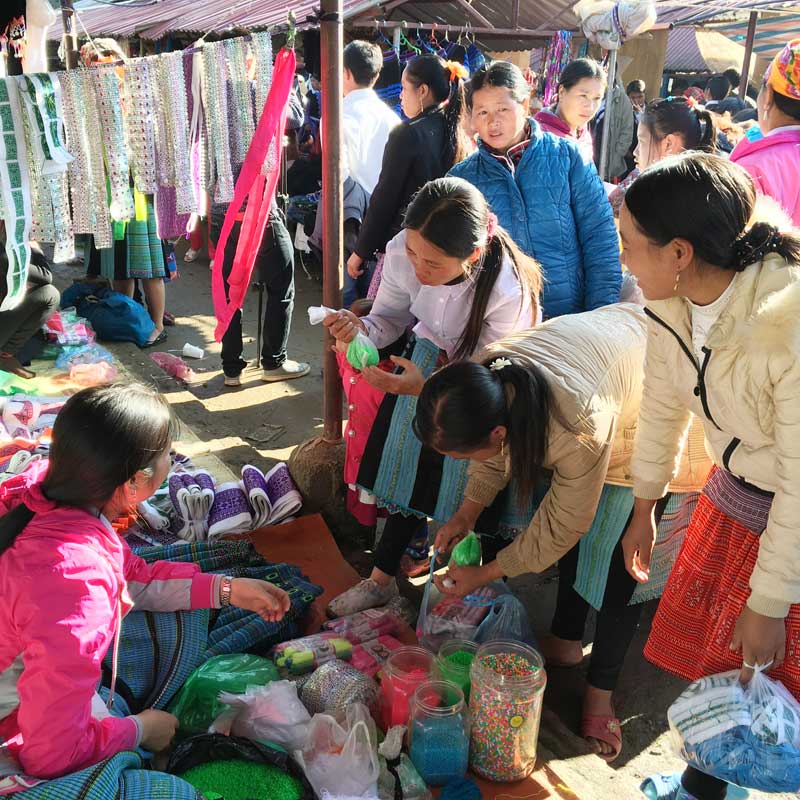
(HBO) - Located in a mountainous region and home to many ethnic groups, Mai Chau district has implemented programmes to expand its trade and services supply network, in a bid to meet demand of local consumers, ensure social welfare, and improve people’s lives.
 Pa Co
market in Mai Chau provides a wide range of products, satisfying the needs of
people in mountainous areas.
Pa Co
market in Mai Chau provides a wide range of products, satisfying the needs of
people in mountainous areas.
Though Xam Khoe market in the commune of
the same name only opens once a week on Saturday, people in the commune and
surrounding areas never face grocery shortage.
Similarly, in the remote and mountainous communes
of Hang Kia, Pa Co, Son Thuy, Tan Thanh and Cun Pheo, local residents could
access diverse products.
The local markets open one day each week. The
market in Mai Chau town opens regularly, while a traditional market for Mai
Chau area is held every Sunday. In addition, there is a network of grocery stores
operated by local people across the district.
Head of Mai Chau district’s Economy and
Infrastructure Division Nguyen Van Dung noted that trade and services in the
district have developed extensively in recent years, with many local shops
opened in communes and hamlets. Many traders and households are willing to deliver
products to hamlets and villages to serve more residents.
The district is home to 10 markets - Mai
Hich, Xam Khoe, Co Luong, Pa Co, Phuc San, Tan Mai, Tan Dan, Noong Luong, Bao
La and Mai Chau. There are also 1,254 trade and services establishments across
the district.
State management and market surveillance
agencies conduct regular inspections of operations of markets and shops.
Therefore, the trading of counterfeit and smuggled goods and those of unknown
origins has significantly reduced, with most goods on the market having good quality,
meeting consumers’ demand and taste.
In 2019, retail sales and service revenues in
the district surpassed 1 trillion VND (42.57 million USD). The figure of the
first two months of this year surged to more than 183 billion VND./.
The Standing Board of the Hoa Binh provincial Party Committee has agreed in principle on a proposal by the Standing Board of the Party Committee of Hoa Binh city to gather feedback on the city’s 1:2000 zoning plan, which forms part of its broader urban development strategy.
Hoa Binh province has made notable progress in public administration reform and digital government development, with the satisfaction index among citizens and businesses reaching over 84%, according to recent government evaluations.
Thanks to great efforts by local authorities in recent times, the governance and public administration performance of Mai Chau district has been significantly improved.
In the afternoon of June 6, the Party Committee, the People's Council, the People's Committee and the Fatherland Front of Lac Son district solemnly held a meeting to celebrate the 139th anniversary of the district's founding (1886–2025) and the 79th anniversary of the establishment of the district's Party Committee (1946–2025). There was the attendance of Mr. Bui Van Thang, the Vice Chairman of the Provincial People's Council; Mr. Quach Tat Liem, the Vice Chairman of the Provincial People's Committee; Ms. Dang Bich Ngoc, the Deputy Head of the National Assembly Delegation of the province; as well as the former leaders of the province and district through various periods, who are the natives of the district.
Implementing the Politburo’s Resolution No. 57-NQ/TW on breakthroughs in science – technology, innovation, and digital transformation is a golden opportunity for the northern mountainous province of Hoa Binh to renew growth model, improve competitive edge and shorten digital gap.
Resolution 57-NQ/TW, issued by the Politburo on December 22, 2024, identifies sci-tech, innovation, and digital transformation as strategic breakthroughs to build a developed and prosperous nation. In Hoa Binh province, this spirit is not just a slogan, it’s being put into action through concrete initiatives that form a "new development triangle”: digital citizenship, digital economy, and digital administration.



 Pa Co
market in Mai Chau provides a wide range of products, satisfying the needs of
people in mountainous areas.
Pa Co
market in Mai Chau provides a wide range of products, satisfying the needs of
people in mountainous areas.